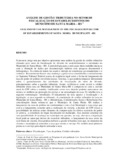| dc.contributor.advisor | Lopes, Luis Felipe Dias | |
| dc.creator | Cabral, Juliano Marcello Jardim | |
| dc.date.accessioned | 2016-04-11T13:26:25Z | |
| dc.date.available | 2016-04-11T13:26:25Z | |
| dc.date.issued | 2012 | |
| dc.date.submitted | 2012 | |
| dc.identifier.uri | http://repositorio.ufsm.br/handle/1/1462 | |
| dc.description | Artigo (especialização) - Universidade Federal de Santa Maria, Centro de Ciências Sociais e Humanas, Curso de Especialização em Gestão Pública Municipal, EaD, RS, 2012. | por |
| dc.description.abstract | The present paper aims at presenting an analysis of tax credit management
accomplished by inspection sector of Permits for establishments and activities in the
Municipality of Santa Maria – RS. The methodology for the performance of this work
starts with data acquirement rough indirect documentation with documental and
bibliographical research. The methods of government statistics and deductive were used
in the data collection. Recently, there was a significant change which consolidated the
Supreme Court understanding about the legal requirement in respect of the form of the
releasing rate of the police power involved in these surveys, which could directly impact
on the management of surveillance activities of Permits sector, mainly on the tax issue.
Thus, it was verified how the tax credit of this duty occurs in the Municipality of Santa
Maria – RS and it was compared to the Supreme Court current decision on the matter,
verifying how this decision could add in terms of improvement in the service rendered
and in the toll collection. The work had the following structure: Introduction; The tax
release as to the location (The legislation, The toll according to the courts, The
constitution of the tax credit of the tribute in the city of Santa Maria – RS);
Methodology, Final Considerations and References. In the Final Considerations it was
reported that Santa Maria City – RS carries out the police rate release in conformity to
the Municipal Law which requires that the release only occurs after the inspection
accomplishment. The Supreme Court decision brought the possibility of utilizing the
existence of a Municipal survey organ as an element of corroboration of the police
power effective exercise. This decision constitutes a possibility of change in the
municipality at issue, ie, modifying the local legislation one may anticipate, within the
taxable year, the rate launch before the survey occurrence. This practice improves the
tax management since, at the moment of the supervision, the municipality had already
arisen the tax that finances the service. In the current model, the service is firstly
rendered, and the tax is collected after this. | eng |
| dc.language | por | por |
| dc.publisher | Universidade Federal de Santa Maria | por |
| dc.rights | Acesso Aberto | por |
| dc.subject | Fiscalização | por |
| dc.subject | Taxa de polícia | por |
| dc.subject | Crédito tributário | por |
| dc.title | Análise de gestão tributária no setor de fiscalização de estabelecimentos do município de Santa Maria - RS | por |
| dc.title.alternative | Analysis of tax management in the fiscalization sector of establishments of Santa Maria municipality - RS | eng |
| dc.type | Trabalho de Conclusão de Curso de Especialização | por |
| dc.degree.local | Polo de Restinga Seca, RS, Brasil | por |
| dc.degree.specialization | Gestão Pública Municipal, EaD | por |
| dc.description.resumo | O presente artigo tem por objetivo apresentar uma análise da gestão do crédito tributário
efetuado pelo setor de fiscalização de Alvarás de estabelecimentos e atividades no
Município de Santa Maria - RS. A metodologia para a realização deste trabalho inicia-se
com a obtenção de dados por documentação indireta com pesquisa documental e
bibliográfica. Na coleta de dados foi usado o método de estatísticas governamentais e o
dedutivo. Recentemente houve uma mudança significativa consolidando o entendimento
do Supremo Tribunal Federal acerca da exigência legal sobre a forma de lançamento da
taxa de poder de polícia envolvida nessas vistorias, o que poderia impactar diretamente
sobre o gerenciamento das atividades de fiscalização do setor de Alvarás,
principalmente sobre a questão tributária. Assim, verificou-se como ocorre o crédito
tributário desta taxa no Município de Santa Maria-RS e comparou-se com a decisão
atual do STF sobre a matéria, verificando como essa decisão poderia acrescentar em
termos de melhora na prestação do serviço e na arrecadação da taxa. O trabalho teve a
seguinte estruturação: Introdução; O lançamento da taxa quanto a localização ( A
legislação, A taxa segundo os tribunais, A constituição do crédito tributário da taxa no
Município de Santa Maria – RS ); Metodologia, Considerações finais e Referências.Nas
considerações finais relatou-se que o Município de Santa Maria- RS realiza o
lançamento da taxa de polícia em conformidade com a Lei Municipal e esta exige que
ocorra o lançamento somente após a realização da vistoria, a decisão do STF trouxe a
possibilidade de utilizar como elemento de comprovação do efetivo exercício do poder
de polícia , a existência de órgão fiscalizador no município. Essa decisão constitui em
uma possibilidade de mudança no município em questão, ou seja, alterando a legislação
local pode-se antecipar dentro do exercício tributário, o lançamento da taxa antes da
ocorrência da vistoria. Essa prática melhora a gestão tributária visto que, no momento da
vistoria o município já arrecadou a taxa que custeia o serviço. No modelo atual primeiro
presta-se o serviço para depois arrecadar a taxa. | por |
| dc.publisher.unidade | Centro de Ciências Sociais e Humanas | por |


